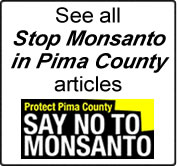A New Level Reached Toward
Non-GMO Tipping Point
by Melissa Diane Smith
American consumers have reached a new level of creating a tipping point of consumer rejection against genetically modified foods, says leading non-GMO advocate and Genetic Roulette movie producer Jeffrey M. Smith.
Several events the past few months and particularly the past few weeks have synergistically worked to catapult the non-GMO consumer movement to another level and push more and more food companies toward non-GMO foods.
It began in March of this year when Whole Foods Market announced that because of consistent requests from its customers, it would require labeling of genetically modified foods sold in their store for products that were not either organic or verified by the Non-GMO Project by 2018. As a result, many food companies that work with Whole Foods began seeking out non-GMO food ingredients.
During April and May, with the help of Facebook, people around the country and world organized the unprecedented worldwide March Against Monsanto, in which 2 million people around the globe marched against genetically modified foods on May 25, 2013, signaling a large, vocal grassroots demand for non-GMO foods.
Then a few days later The New York Times ran the article “Seeking Food Ingredients That Aren’t Gene-Altered” with the lead paragraph stating: Food companies big and small are struggling to replace genetically modified ingredients with conventional ones.
That was followed by the discovery of an unapproved strain of genetically modified wheat growing in a field in eastern Oregon, which led to a few countries suspending imports of U.S. wheat, which in turn led to a lawsuit from a farmer against the genetically modified seed giant Monsanto. Similar lawsuits are in the works.
Finally, on June 3, the Connecticut legislature passed a bipartisan GMO labeling bill, making it the first state in the nation to require food manufacturers to reveal whether their products contain genetically modified ingredients. Though there is a complicating catch with the bill – the law will not go into effect until similar legislation is adopted by at least four other states, including one that borders Connecticut – the passage of the bill has added to a tidal wave of events that the food industry has been forced to notice.
Even if no other states pass GMO labeling bills – and that’s not a given considering several states will be voting on bills in the next few months and Washington state will be voting on a citizens initiative in November – it’s important to keep in mind that reaching the non-GMO tipping point can be achieved without any required labeling, Smith says.
Simply because of people becoming knowledgeable about the nine genetically modified foods on the market and avoiding them or seeking out non-GMO options, we’ve now reached the “Awake and Scramble” stage of creating the tipping point, according to Smith. This means that food manufacturers have become aware of the facts pointing to the huge growing demand for Non-GMO foods and manufacturers are now scrambling to look into securing sources for non-GMO ingredients. “They realize that if they aren’t quick to be on this, they could lose shares,” Smith says.
The next stage is the “Battle for the Market Share,” in which more mainstream companies start to offer non-GMO foods. If Non-GMO Project Verified labels lead to increased sales of those products with more mainstream Americans buying them, big food companies will realize non-GMO is a huge selling point and want to cut genetically modified ingredients out of their products for good.
That will eventually lead to a cleanout of the direct sources of GMOs, such as corn, soy, sugar, and canola oil, and then a cleanout of GMOs in animal feed, Smith says.
So, now that we’ve reached this new stage in achieving the tipping point, what do we do? Shop non-GMO and convince everyone in your sphere that you can, even people who don’t normally buy organic foods or shop in health food stores, to buy non-GMO as well. When the people speak with their wallets, food companies, no matter how big, are forced to listen.
Copyright © 2013 Melissa Diane Smith
